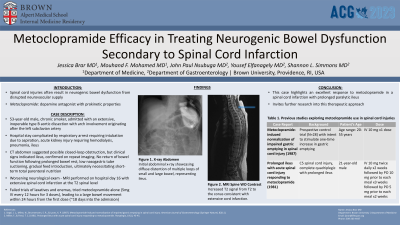Monday Poster Session
Category: Functional Bowel Disease
P1965 - Metoclopramide Efficacy in Treating Neurogenic Bowel Dysfunction Secondary to Spinal Cord Infarction
Monday, October 23, 2023
10:30 AM - 4:15 PM PT
Location: Exhibit Hall

Has Audio

Mouhand FH Mohamed, MD
Brown University
Providence, RI
Presenting Author(s)
Jessica Brar, MD, Mouhand FH. Mohamed, MD, John Paul Nsubuga, MD, Yousef Elfanagely, MD, Shannon Simmons, MD
Brown University, Providence, RI
Introduction: Spinal cord injuries often result in neurogenic bowel dysfunction from disrupted neurovascular supply. Metoclopramide, a dopamine antagonist with prokinetic properties, has shown efficacy in gastric motility disorders. However, literature on its use in spinal cord injury-induced neurogenic bowel dysfunction, particularly spinal cord infarction, is scarce. This report highlights an excellent response to metoclopramide in a spinal cord infarction patient with prolonged paralytic ileus.
Case Description/Methods: We present a case of a 53-year-old male chronic smoker admitted with an extensive inoperable type B aortic dissection with arch involvement originating after the left subclavian artery. His hospital stay was complicated by respiratory arrest requiring intubation due to aspiration from suspected small bowel obstruction, acute kidney injury requiring hemodialysis, and pneumonia. CT abdomen suggested possible closed-loop obstruction, but clinical signs indicated ileus, confirmed on repeat imaging (Figure 1). Despite prolonged bowel rest, low nasogastric tube suctioning, gradual feed introduction, laxatives, and enemas, bowel function did not return, necessitating short-term total parenteral nutrition. The patient was noted to have a worsening neurological exam including mute responses to plantar flexion. Thus, an MRI was performed on day 16, revealing an extensive spinal cord infarction at the T2 spinal level. For suspected infarct-related ileus following failed trials of laxatives and enemas, we tried metoclopramide alone (5mg IV every 12 hours for 3 doses), leading to a large bowel movement within 24 hours from the first dose (nearly ~18 days into the admission). No adverse events occurred, however, due to the guarded prognosis and in respect to the family's wishes, the care focus shifted towards comfort measures, and the patient passed away shortly after.
Discussion: This case report underscores the potential of metoclopramide in managing neurogenic bowel dysfunction, especially in patients with spinal cord infarctions. The drug helped facilitate bowel movements in a case of prolonged ileus, thus significantly improving patient comfort. This aligns with previous suggestions of metoclopramide's effectiveness in such cases (Table 1) and invites further research into this therapeutic approach.

Disclosures:
Jessica Brar, MD, Mouhand FH. Mohamed, MD, John Paul Nsubuga, MD, Yousef Elfanagely, MD, Shannon Simmons, MD. P1965 - Metoclopramide Efficacy in Treating Neurogenic Bowel Dysfunction Secondary to Spinal Cord Infarction, ACG 2023 Annual Scientific Meeting Abstracts. Vancouver, BC, Canada: American College of Gastroenterology.
Brown University, Providence, RI
Introduction: Spinal cord injuries often result in neurogenic bowel dysfunction from disrupted neurovascular supply. Metoclopramide, a dopamine antagonist with prokinetic properties, has shown efficacy in gastric motility disorders. However, literature on its use in spinal cord injury-induced neurogenic bowel dysfunction, particularly spinal cord infarction, is scarce. This report highlights an excellent response to metoclopramide in a spinal cord infarction patient with prolonged paralytic ileus.
Case Description/Methods: We present a case of a 53-year-old male chronic smoker admitted with an extensive inoperable type B aortic dissection with arch involvement originating after the left subclavian artery. His hospital stay was complicated by respiratory arrest requiring intubation due to aspiration from suspected small bowel obstruction, acute kidney injury requiring hemodialysis, and pneumonia. CT abdomen suggested possible closed-loop obstruction, but clinical signs indicated ileus, confirmed on repeat imaging (Figure 1). Despite prolonged bowel rest, low nasogastric tube suctioning, gradual feed introduction, laxatives, and enemas, bowel function did not return, necessitating short-term total parenteral nutrition. The patient was noted to have a worsening neurological exam including mute responses to plantar flexion. Thus, an MRI was performed on day 16, revealing an extensive spinal cord infarction at the T2 spinal level. For suspected infarct-related ileus following failed trials of laxatives and enemas, we tried metoclopramide alone (5mg IV every 12 hours for 3 doses), leading to a large bowel movement within 24 hours from the first dose (nearly ~18 days into the admission). No adverse events occurred, however, due to the guarded prognosis and in respect to the family's wishes, the care focus shifted towards comfort measures, and the patient passed away shortly after.
Discussion: This case report underscores the potential of metoclopramide in managing neurogenic bowel dysfunction, especially in patients with spinal cord infarctions. The drug helped facilitate bowel movements in a case of prolonged ileus, thus significantly improving patient comfort. This aligns with previous suggestions of metoclopramide's effectiveness in such cases (Table 1) and invites further research into this therapeutic approach.

Figure: Figure 1) X-Ray Abdomen.
Initial x-ray of the abdomen showcasing diffuse distention of multiple loops of small and large bowel, representing ileus.
Initial x-ray of the abdomen showcasing diffuse distention of multiple loops of small and large bowel, representing ileus.
Disclosures:
Jessica Brar indicated no relevant financial relationships.
Mouhand Mohamed indicated no relevant financial relationships.
John Paul Nsubuga indicated no relevant financial relationships.
Yousef Elfanagely indicated no relevant financial relationships.
Shannon Simmons indicated no relevant financial relationships.
Jessica Brar, MD, Mouhand FH. Mohamed, MD, John Paul Nsubuga, MD, Yousef Elfanagely, MD, Shannon Simmons, MD. P1965 - Metoclopramide Efficacy in Treating Neurogenic Bowel Dysfunction Secondary to Spinal Cord Infarction, ACG 2023 Annual Scientific Meeting Abstracts. Vancouver, BC, Canada: American College of Gastroenterology.
